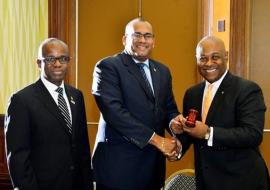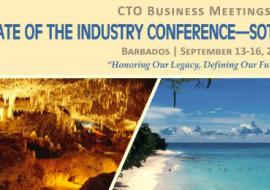Experts Call for Balance at Caribbean Tourism Conference
A diverse group of experts called for a balance between environmental and economic interests during the 10th Annual Caribbean Conference on Sustainable Tourism.
Speaking as part of a panel on the theme Challenges for the Caribbean Coastal Tourism Environment, they pointed to “the inexorable link” between the seemingly divergent causes of profit and ecological protection, with each playing a role in the future of Caribbean tourism.
According to Rick MacPherson, director of the conservation programme for the Coral Reef Alliance (CORAL ), Caribbean leaders must consider a “triple bottom line” to address coastal environment sustainability as it relates to tourism.
“The fact of the matter is that no conservation programme or goal is achievable unless it’s economically viable,” he said. “It has to be a combination of business success, environmental protection and demonstrating social responsibility.”
MacPherson estimated losses between $100 and $300 million in revenues for the dive tourism industry in the Caribbean should the quality of the dive experience be diminished due to the destruction of coral reefs and loss of marine life. He pointed to global climate change as a key driver of such destruction.
He further warned that the ancillary effects of such a loss would have a wider scope of impact beyond tourism.
“Fifty per cent of all cancer research is focused on marine life originating from coral reefs,” said MacPherson. “The drug AZT, which has prolonged the lives of thousands suffering from AIDS, comes through sponge species from coral reefs.”
All panelists agreed with the session’s moderator, Caribbean Tourism Organization Secretary General Vincent Vanderpool-Wallace, that the conference itself is a step in the right direction for raising awareness and offering options for the region’s coastal tourism sustainability.
“The very fact that such a conference exists and attendance is up significantly shows that this is an issue the tourism industry takes very seriously, and rightly so. It may be the single most important issue facing us today and into the future,” Vanderpool-Wallace said.














